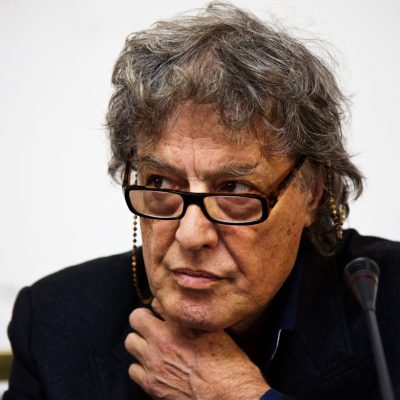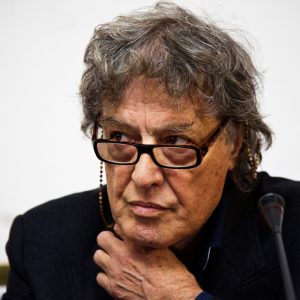Daniel Ellsberg: The original whistleblower
[vc_row][vc_column][vc_single_image image=”116892″ img_size=”full” add_caption=”yes”][vc_column_text]
Whistleblower Daniel Ellsberg, whose leaks 50 years ago this summer aimed the spotlight at the US government’s secret escalation of the conflict in Vietnam over the course of five presidential administrations, is clear that such shattering revelations should not happen just once in a generation.
“There should be something of the order of the Pentagon Papers once a year if not more often,” he said.
Ellsberg speaks to me over Zoom from his home in California’s Bay Area shortly after celebrating his 90th birthday. His mind is as sharp as ever and his belief that government wrongdoing should be uncovered is as strong as it was more than five decades ago. His leaking of thousands of pages of critical failings of presidents from John F Kennedy through to Richard Nixon in US involvement in Vietnam – the Pentagon Papers – proved damning, and ultimately led to Tricky Dicky’s impeachment.
Instead of such yearly disclosures of wrongfully withheld information, Ellsberg says it took 39 years before there was a leak of a similar scale – Chelsea Manning’s disclosure of hundreds of thousands of US diplomatic cables and their subsequent publication by Julian Assange on Wikileaks in 2010.
[/vc_column_text][vc_btn title=”Join Daniel Ellsberg at our virtual magazine launch on Tuesday 3 August: Book a free ticket NOW” color=”danger” size=”lg” link=”url:https%3A%2F%2Fwww.eventbrite.co.uk%2Fe%2Fwhistleblowers-the-lifeblood-of-democracy-tickets-164316941395″][vc_column_text]
On US foreign policy
Ellsberg is of the belief that the world needs a new generation of whistleblowers to keep his government in check.
“US foreign policy is largely conducted as a covert, plausibly denied, imperial policy,” he said.
“We deny we are an empire, and we deny the means we use, the means which every empire uses to maintain its hegemony – torture, paramilitary invasion, assassination. This is the standard for everybody who seeks a global influence over countries and gets involved in regime change the way we do.”
But a career as a whistleblower is unlikely to be recommended to young people emerging from education any time soon.
“I have never heard of anyone wanting to be a whistleblower,” said Ellsberg. “People admire it when they see it, but it is a strange career to set out on – and it’s not a career because you generally only get to do it once. Employers believe you won’t tell their dirty secrets no matter how criminal, illegal, wrongful or dangerous your bosses may be.”
He says that people entering the world of work for the first time need to understand what they are signing up for.
“When young people sign agreements [with their employers] under which they will be asked to not reveal any secrets they become privy to in their job they should take into account that they don’t really have a right to keep that promise in all circumstances,” he said. “Circumstances may well arise where it is wrong to keep silent about information that has come to your attention because other lives are at stake, or perhaps the constitution is being violated and it is wrongful to keep that promise.
“It doesn’t occur to you that you could be asked to take part in very wrongful or criminal activities. In your eyes you are not joining the Mafia, yet you make a promise of secrecy like the Mafia without knowing what you are going to be asked to do. This is why you should have your fingers crossed when you make that promise.”
Ellsberg relates being invited to a meeting in Stockholm to give an award to Ingvar Bratt, who had exposed illegal sales by arms dealer Bofors.
“Bratt told me that he was explaining to his young son – who was 10 or so – that he was meeting me and explained what I had done. He said to his son: ‘Wasn’t that a good thing to do?’ His son said very soberly: ‘Oh no. He shouldn’t have done that; you should never break a promise’. That is how we are all brought up.
“Young people should remain open to the idea that you may be called on to risk your job, your career, your relationships with other people by telling the truth even if you have promised not to do that. It is very unusual advice for young people to hear; it will not improve their career prospects, but it will possibly save a lot of lives.”
On what distinguishes whistleblowers
Ellsberg is in regular contact with other whistleblowers – a club with a very exclusive membership.
“Whistleblowers believe themselves to be quite ordinary,” he said. “They don’t think that what they did is particularly unusual. They think what they did was the thing anyone would have done in the circumstances.
“But stepping back from their views, it is very unusual for people to do what they did in those circumstances. In almost every case their colleagues knew what was happening and that [the wrongdoing] should be known, but they did not ask themselves if they should be the one to tell.
“There is something unfortunately quite rare about whistleblowing, and that is not good for the future of our species. It means that when terribly dangerous processes are at work, like wrongful wars or the climate crisis, we can’t count on people to step forward and tell us what we need to know.
“Very few people get beyond the point of saying ‘This should be known’ to the point of saying ‘No one else is going to do it, so I have to do it’. That turns out to be an almost unpredictable reaction. It is a matter of personal responsibility and moral courage.”
Moral courage is a vital attribute of a whistleblower, since being ostracised is a frequent outcome.
“People will do almost anything and go along with anything rather than be expelled from a group that they value,” said Ellsberg.
On Assange and Manning
But being cast out is often the least of the worries of would-be whistleblowers, as the act comes with significant costs.
“Chelsea Manning said she was willing to face life in prison or even death,” said Ellsberg. “[Edward] Snowden said at one point there were things worth dying for and he hadn’t been killed for it yet, but he was at considerable risk of that – and it could still happen.
“The government does everything it can to magnify those costs both for the whistleblower and anyone who might want to imitate her or him. There is the stigma of being called crazy, being called criminal. The government really goes into trying to defame the whistleblower in different ways, and often quite successfully.
“Assange and Snowden have been made into real pariahs. I was called a lot of names at the time and if you are not willing to be called names that are painful but inappropriate and unearned then this is not something you should go into.”
On Reality Winner
Being a whistleblower today is different from how it was 50 years ago. Technology has made it easier to share information but has also made leaks easier to trace.
“Reality Winner’s case is a classic example of the technical possibility of tracing the source. They were able to see who had probably released it. It illustrates that it is easy to get the information out, but it is relatively hard to hide the fact that you were the one who was the source.
Ellsberg says Winner, who leaked classified information about Russian involvement in the 2016 US presidential election, “did what she should have done”.
Should she have been sent to prison? “Absolutely not.”
“There was evidence of Russian involvement [in the election] which the administration was denying. It was important for the public to know that,” he said.
Winner has now been released from prison early thanks to good behaviour but is still prevented from speaking about the case.
Ellsberg believes a pardon for Winner from president Joe Biden looks unlikely, especially as he has not done the same for Julian Assange.
“Biden, or someone under him who was a holdover from the Trump administration, has renewed the appeal to extradite Julian Assange and that is not entirely surprising. Biden called Assange a ‘hi-tech terrorist’ at the time of the releases that he is indicted for in 2010,” he said.
“It goes against the fact that the Obama administration declined to indict Assange on the very good conclusion [that he was] a journalist releasing information to the American public. Biden could have gone along with that. I still have some small hope that he will [pardon him] as he should, but I don’t count on it.”
Ellsberg is convinced that Assange deserves protection for leaking the Manning cables.
“He certainly acted as a journalist, as a publisher specifically – as much as any of the publishers with whom he shared the Chelsea Manning documents. [Assange’s] philosophy of journalists is actually broader than some others and reflects a relatively new digital age philosophy which I don’t entirely share. He believes in almost absolute transparency with the government, but not of private people. Although I think there are secrets that I am in favour of not releasing, that’s not true of the material he is indicted for in 2010.”
I ask Ellsberg whether he would do the same today as he did 50 years ago and he says he wouldn’t be happy sitting around for months waiting for a paper to dare to publish.
“I would still go first to The New York Times, but If I didn’t hear from them I would go elsewhere. If I felt that the Times was holding back, as it seemed to be doing for several months when I was dealing with [then NYT reporter] Neil Sheehan, I would have to gone to another channel such as Wikileaks or the web directly. Of course, that didn’t exist then.”
He says “the chance of being fingered is greater than it was before”, but concurs that he would do it again.
In one sense, he already has, with the publication of The Doomsday Project on US nuclear policy in 2017 that was based on further material he had copied in his time at government- funded military research organisation Rand Corporation in the 1960s.
That makes Ellsberg that very rare thing: a career whistleblower.
Daniel Ellsberg and the Pentagon Papers
Daniel Ellsberg was born in Chicago in 1931. After graduating from Harvard in 1952 with a BA summa cum laude in economics, he studied for a year on a Woodrow Wilson Fellowship at King’s College, Cambridge.
From 1954 to 1957 he served in the US Marine Corps and in 1962 he earned his PhD in economics at Harvard.
Ellsberg joined the Rand Corporation – a policy thinktank offering research and advice to the US armed forces – in 1959 as a strategic analyst. As part of this role he acted as a consultant to the White House and US Defence Department, specialising in problems of the command and control of nuclear weapons and drafting the operational plans for general nuclear war.
In the mid-1960s, he joined the Defence Department for a year as special assistant to assistant secretary of defence John McNaughton, working on the escalation of the war in Vietnam before serving two years with the US State Department in Saigon.
He returned to the Rand Corporation in 1967 where he worked on the top-secret McNamara study, looking at US decision-making in Vietnam between 1945 and 1968.
Ellsberg says the material that became known globally as the Pentagon Papers did not at first appear to be anything special.
“They didn’t look that effective as they ended in 1968. I assumed that the president [Richard Nixon] would say ‘This is old history and doesn’t have anything to do with me’. It was just a fifth president following in the footsteps of four previous presidents,” said Ellsberg.
The 7,000-page report was duplicated on a Xerox photocopier with the help of his Rand colleague Anthony J Russo.
“In those days it was a fairly slow process, copying just one page at a time,” he said. “Keeping it secret wasn’t a problem. In those days, the guards at the Rand Corporation who checked everyone in and out didn’t get to check in your briefcase. It made my heart pound when I went past them the first few times with a briefcase full of top-secret documents.”
If 7,000 pages were not enough, he also copied thousands more pages of documents relating to US nuclear policy, which he revealed in his book The Doomsday Machine, published in 2017.
The decision to leak came after listening to anti-Vietnam War activist Randy Kehler.
“It was seeing someone with whom I could identify who had a career and who was willing to go to prison,” he said. “It made me ask myself ‘What can I do now that I am ready to go to prison?’”
Ellsberg leaked the report in 1971 to The New York Times, The Washington Post and 17 other newspapers but it was the Times which took the plunge after sitting on the explosive material for months. On Sunday 13 June 1971, it published its first excerpts from the report, but its wider circulation was held up for 15 days due to a court order requested by the Nixon administration.
The release of information showed that the USA had illegally expanded the scope of the Vietnam War and that the administration of president Lyndon Johnson had lied to the public and Congress.
In early 1973, Ellsberg surrendered to the authorities and faced eight charges of espionage, six of theft and one of conspiracy which, if convicted, carried a possible sentence of 115 years.
In the event, Ellsberg did not go to jail for even a single year.
After a four-and-a-half month trial, the charges against him were dropped after the presiding judge, William Matthew Byrne Jr, ordered a mistrial over “improper government conduct” in relation to illegal evidence-gathering.
It was revealed during the trial that representatives of the administration had illegally broken into the office of Ellsberg’s psychiatrist and attempted to steal files in order to discredit him. The FBI had also set up illegal wiretaps on the home phone of security consultant Morton Halperin, through which the FBI overheard his conversations with Ellsberg about the papers.
Indirectly, the Pentagon Papers would lead to Nixon’s impeachment. His anger at constant leaks led to the illicit wiretapping and burglaries that ended with his downfall over the Watergate scandal.
[/vc_column_text][vc_btn title=”Join Daniel Ellsberg at our virtual magazine launch on Tuesday 3 August: Book a free ticket NOW” color=”danger” size=”lg” link=”url:https%3A%2F%2Fwww.eventbrite.co.uk%2Fe%2Fwhistleblowers-the-lifeblood-of-democracy-tickets-164316941395″][/vc_column][/vc_row]





